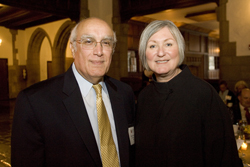|
All but one of Temple's school and colleges are welcoming at least one new tenured and tenure-track faculty member in 2008-09. The College of Liberal Arts leads the way with 17 new hires, although the Fox School of Business (14) and the School of Communications and Theater (10) are bringing unusually large cohorts. The individual department with the largest number of new faculty recruits is the College of Education's Department of Curriculum, Instruction and Technology in Education, with four new hires.
Among the Fall 2008 faculty recruits are four department chairs: Jeffery Henderer, formerly of Thomas Jefferson University Medical College, is the new chair of the School of Medicine's Department of Ophthalmology; Mindie Lazarus-Black, who joined Temple's College of Liberal Arts from the University of Illinois at Chicago, is chairing the Department of Anthropology; Yuri Persidsky has come from the University of Nebraska Medical Center to chair the School of Medicine's Department of Pathology and Laboratory Medicine; and Frances Ward, formerly of the University of Medicine and Dentistry of New Jersey, is the first David R. Devereaux Chair in Nursing at the College of Health Professions. In addition, Gerard Brown has come from the Art Center College of Design in Pasadena to serve as the Tyler School of Art's interim chair of the Foundations Department.
This year's newcomers include faculty members hired from Carnegie Mellon University, Cornell University, the University of Pennsylvania, the University of Pittsburgh, the University of Sydney (Australia), the University of Texas, Tulane University, Villanova University and Wyeth Laboratories.
Although the first few waves of Temple faculty recruits in the current faculty hiring effort included many full professors, this year's group is dominated by tenure-track faculty members.
"It's essential for our faculty ranks to be replenished by great scholars and researchers of all levels," said Provost and Senior Vice President for Academic Affairs Lisa Staiano-Coico. "A vibrant faculty is a balanced faculty."
According to university leaders, Temple's hiring boom has been made possible by a complex suite of factors. Enrollment has surged by about 20 percent since 2000, generating more tuition revenue and a need for more instructors. In addition, the retirement of a large number faculty members hired in the late 1960s and '70s — the years following Temple's designation as a state-related institution in the Commonwealth System of Higher Education — has increased the number of vacancies.
The Office of the Provost also credited the energy of Temple's deans, many of whom are also new arrivals. For example, the presence of Hai-Lung Dai, who took over the deanship of Temple's College of Science and Technology in 2006, helped lure renowned inorganic chemist Professor Bradford Wayland from Penn.
Wayland, who will be moving into renovated laboratory space, and other new faculty members also cited the university's urban location and many new and improved facilities.
"Temple is in growth mode," Wayland said. "There is an expansive vision of what the possibilities are, and how our urban university… can address major issues. A substantial portion of the facilities are being renovated, and new construction is planned."
For Eric M. Eisenstein, an expert in managerial and consumer decision-making who joined Fox's Marketing Department from Cornell's Johnson School of Business, part of Temple's appeal was the promise of Alter Hall, Fox's new, state-of-the-art home scheduled to open for classes in January 2009.
"New facilities are great," Eisenstein said. "They're a sign of good leadership. That's what I see at Temple: We have a great chair, a great dean, a new provost and a new president — we even have new leadership in the city with Mayor Nutter — and they're all doing good things. At a large urban university with a meaningful mission and great leadership, we'll have an opportunity to make profound changes in the lives of many people. That's what really matters."
|
